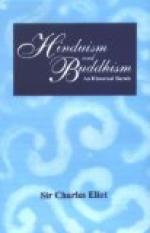Of the three religions, Confucianism has a disputable claim to the title. If the literary classes of China find it sufficient, they do so only by rejecting the emotional and speculative sides of religion. The Emperor Wan-li[562] made a just epigram when he said that Confucianism and Buddhism are like the wings of a bird. Each requires the co-operation of the other. Confucius was an ethical and political philosopher, not a prophet, hierophant or church founder. As a moralist he stands in the first rank, and I doubt if either the Gospels or the Pitakas contain maxims for the life of a good citizen equal to his sayings. But he ignored that unworldly morality which, among Buddhists and Christians, is so much admired and so little practised. In religion he claimed no originality, he brought no revelation, but he accepted the current ideas of his age and time, though perhaps he eliminated many popular superstitions. He commended the worship of Heaven, which, if vague, still connected the deity with the moral law, and he enjoined sacrifice to ancestors and spirits. But all this apparently without any theory. His definition of wisdom is well known: “to devote oneself to human duties and keep aloof from spirits while still respecting them.” This is not the utterance of a sceptical statesman, equivalent to “remember the political importance of religion but keep clear of it, so far as you can.” The best commentary is the statement in the Analects that he seldom spoke about the will of Heaven, yet such of his utterances about it as have been preserved are full of awe and submission.[563] A certain delicacy made him unwilling to define or discuss the things for which he felt the highest reverence, and a similar detached but respectful attitude is still a living constituent of Chinese society. The scholar and gentleman will not engage in theological or metaphysical disputes, but he respectfully takes part in ceremonies performed in honour of such venerated names as Heaven, Earth and Confucius himself. Less willingly, but still without remonstrance, he attends Buddhist or Taoist celebrations.
If it is hard to define the religious element in Confucianism, it is still harder to define Taoism, but for another reason, namely, that the word has more than one meaning. In one sense it is the old popular religion of China, of which Confucius selected the scholarly and gentlemanly features. Taoism, on the contrary, rejected no godlings and no legends however grotesque: it gave its approval to the most extravagant and material superstitions, especially to the belief that physical immortality could be insured by drinking an elixir, which proved fatal to many illustrious dupes. As an organized body it owes its origin to Chang-Ling (c. 130 A.D.) and his grandson Chang-Lu.[564] The sect received its baptism of blood but made terms with the Chinese Government, one condition being that a member of the house of Chang should be recognized as its hereditary Patriarch or Pope.[565] Rivalry with Buddhism also contributed to give Taoism something of that consistency in doctrine and discipline which we associate with the word religion, for in their desire to show that they were as good as their opponents the Taoists copied them in numerous and important particulars, for instance triads of deities, sacred books and monastic institutions.




